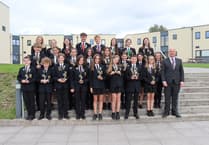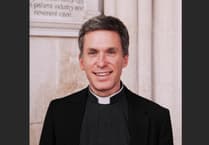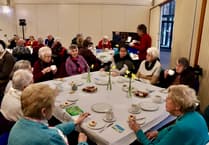REV David Greenwood led the Covenant Service at Crediton Methodist Church on Sunday, January 12.
John Wesley led the first Covenant Service on August 11, 1755 at the French Church, Spitalfields, London when there were 1,800 people present.
Ever since then, Methodist people have held a Covenant service at the beginning of each year at which we celebrate all that God has done for us and we affirm that we give our lives and choices to God.
The Covenant prayer makes it clear that this affirmation is a serious one and embraces the whole of our lives in all its parts.
David spoke about Terah, whom God told to take his family from Ur to the promised land of Canan.
Terah started on the journey but when he got to Haran is did not continue on the journey. It was his son Abram who followed God’s command and travelled on to Canan. Because of that, God promised Abram he would be the “father of nations”.
God’s covenant saw Abraham (as Abram was later known) become the father of nations and the person to whom Christians look to.
The word covenant has two meanings – firstly an agreement between two groups. Secondly a testament.
There are lots of covenants in the Bible – the first one was with Noah that there would never be another flood. Lots of kings made covenants with each other.
The most famous covenant is that made to the people of Israel through Moses who wrote down quite a lot of rules.
One of the rules mentioned a lot in the Bible is that of the marriage contract and Malachi has a lot to say about the breaking of the marriage contract.
He is writing to the people of Israel as if they are the groom. He is not talking about a marriage, but about the covenant because they, like us, found it difficult to keep all the rules Moses wrote down.
Many of us were here for the Covenant service last year and we can look back and say we did not keep all of the premises we made. So, before we make the covenant again, we should make confession.
In Jeremiah 31 we heard of the New Covenant.
After all the old rules, something had to happen to allow the new covenant to occur. God became incarnate and the new covenant (ie the New Testament) tells us of the birth, life and teaching of Jesus and leads us to Easter.
In Exodus, Moses poured blood over 12 pillars representing the 12 tribes of Israel.
In first century Palestine when there was a wedding the bride was offered a cup of wine representing the blood of the covenant. If the bride drank the wine, she sealed the deal and the covenant was made.
In the readings from the Old Testament we heard how God made covenants with his people.
In Mark we read about the Last Supper where Jesus said the wine was His blood of the new covenant. The body and blood of the new covenant was offered to us and we all took Communion.
David spoke about the baptism service for a baby from the new Methodist Worship book. The child is welcomed into the family of God before the parents are asked to make promises.
The child is already loved and welcomed whether the parents are able to make promises. We are welcomed and loved and that is why we took Communion before we were asked to make our covenant promises.
God’s part of the covenant has already been done – Jesus died on the cross for us and was raised into Heaven for us. Jeremiah spoke of the gift of the spirit that the words of the law are in our hearts and the spirit of God is known to each of us.
The covenant that we are about to remake is our response in joy and love for what has already been offered and what has already been done - we are a new creation. It is not a burden, but a thanksgiving response to a loving God.
Bronwyn Nott





Comments
This article has no comments yet. Be the first to leave a comment.